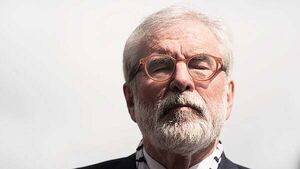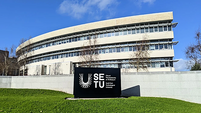BBC must pay damages and legal costs to Gerry Adams pending any appeal

High Court Reporters
A High Court judge has directed the BBC to pay €50,000 damages, plus €250,000 legal costs, to former Sinn Féin president Gerry Adams pending a possible appeal by the broadcaster against the full costs and damages orders made in his defamation case.
On those conditions, Mr Justice Alexander Owens agreed on Monday to give the BBC a stay on payment of the full €100,000 damages awarded to Mr Adams by a High Court jury.
The stay also applies to the judge’s order for the BBC to pay Mr Adams legal costs, estimated at up to €3 million.
Eoin McCullough SC, for the BBC, said it is still considering whether to bring an appeal against the jury decision and award made last Friday.
When counsel asked about a further stay on the conditions of the stay imposed by the judge, the judge told him he would have seek any such further stay from the Court of Appeal.
The judge was told the BBC is still considering whether to appeal last Friday’s finding by a High Court jury that it defamed Mr Adams by publishing a claim that he sanctioned the murder of a British agent. The jury awarded Mr Adams €100,000 damages to vindicate and restore his reputation.
Following the verdict, Mr Justice Owens made costs orders in favour of Mr Adams. The amount of costs, yet to be decided, has been estimated at up to €3 million for the 21 day action.
Mr Adams claimed the 2016 Spotlight programme and a related article defamed him by falsely accusing him of giving “the final say” in the murder of MI5 informant Denis Donaldson by dissident republicans at a cottage in Glenties, Co Donegal, in 2006.
The jury agreed, as Mr Adams had pleaded in his claim, that words published in the programme and article were understood to mean he sanctioned and approved the murder.
The BBC had argued the claim against Mr Adams was couched as an allegation but the jury rejected the BBC’s defence that the publication of the allegation was fair, reasonable and in the public interest.
On Monday, Mr McCullough outlined a number of possible grounds of appeal, including concerning the treatment of evidence from the family of Mr Donaldson and a decision to exclude evidence of Austin Stack, whose father was shot by the IRA in 1993.
The judge said he was “not really persuaded” there was anything in any but one of the grounds set out.
He said he was “partly” with counsel on a point concerning how the jury had considered defences by the BBC that the publication was in good faith and was fair and reasonable.
There was a point concerning whether the jury should have been asked to consider whether the publication was done in good faith prior to considering whether it was fair and reasonable, he agreed.
He did not think there was anything in the other points, the judge said.
Mr McCullough said his side regarded the jury’s award of €100,000 as unsustainable for a broadcast of “very small circulation”.
The judge said it was obvious a broadcast like that would be picked up and there was publicity about the allegation made against Mr Adams.
To accuse anyone of murder, of sanctioning a murder, “is right up there at the top in my view”, he said.
Mr McCullough said Mr Adams had not pleaded a case for damages on the basis of republication elsewhere. The judge suggested the plaintiff’s side could have argued the BBC would have known something “as nefarious as that” would be immediately picked up.
Earlier, Thomas Hogan SC, for Mr Adams, said there was a “low bar” for an appeal, that an appellant had to show a ground was arguable.
Counsel said he did not propose to fight any appeal point at this stage. There was a “very significant inequality of arms” between the sides but his side, with very limited resources, had managed to prevail, he said.
Mr Hogan said the BBC was seeking the stay without even saying it was going to appeal the jury outcome. That suggested the stay application was strategic and any stay should have conditions attached, including for payment of something towards the award and costs.
Mr McCullough said he wholly rejected any suggestion of bad faith in the stay application. The BBC wanted to take advice and had not yet decided on an appeal, he said. It was likely any appeal would be heard promptly, he added.
The judge, who said he did not regard the stay application as a strategic one, granted a stay on payment of the full award and legal costs on condition the BBC pay out €50,000 of the award to Mr Adams and €250,000 towards his legal costs.
In other submissions, Mr Hogan accepted his side could not seek some extra-territorial injunction which would ‘geoblock’ the disputed publication. When counsel referred to concerns in some quarters last weekend about the prospect of geo-blocking “the entire BBC”, the judge laughed and said he had read those.
There was no jurisdiction to do that, he said.
The jury award of damages was made on the basis of it being told an injunction was not an available remedy, the judge added.




